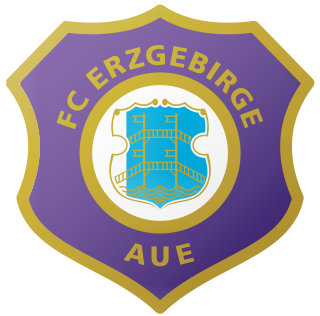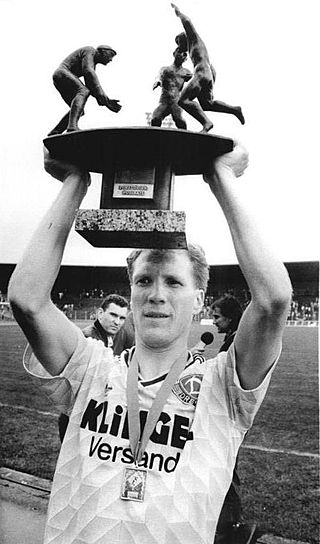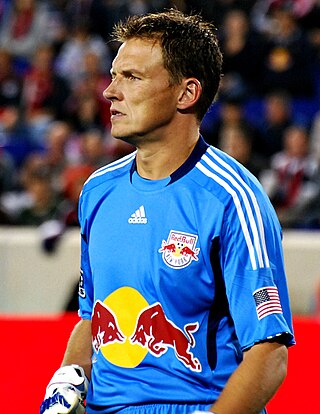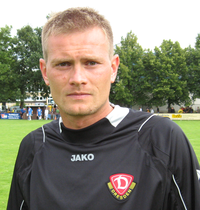
Kasey C. Keller is an American former professional soccer player who played in Europe and the United States, and was the starting goalkeeper for the U.S. national team. He is a four-time FIFA World Cup participant and was the first American goalkeeper to become a regular in the German Bundesliga, the English Premier League, and the Spanish La Liga.

Fußball Club Erzgebirge Aue e.V., commonly known as simply FC Erzgebirge Aue or Erzgebirge Aue, is a German football club based in Aue-Bad Schlema, Saxony. The former East German side was a founding member of the 3. Liga in 2008–09, after being relegated from the 2. Bundesliga in 2007–08. The city of Aue-Bad Schlema has a population of about 20,800, making it one of the smallest cities to ever host a club playing at the second highest level of German football. However, the team attracts supporters from a larger urban area that includes Chemnitz and Zwickau, whose own football sides are among Aue's traditional rivals.

Chemnitzer Fußballclub e.V. is a German association football club based in Chemnitz, Saxony. The club competes in Regionalliga Nordost, the fourth tier of German football.

The FDGB-Pokal was an elimination football tournament held annually in East Germany. It was the second most important national title in East German football after the DDR-Oberliga championship. The founder of the competition was East Germany's major trade union.

Frank Rost is a German former professional footballer who played as a goalkeeper.
The 1971–72 DDR-Oberliga was the 23rd season of the DDR-Oberliga, the first tier of league football in East Germany.
The 1954–55 DDR-Oberliga was the sixth season of the DDR-Oberliga, the first tier of league football in East Germany. After the 1954–55 season the league played a transition round in autumn 1955, followed by five seasons, until 1960, where it played in the calendar year format. From 1961–62 onwards the league returned to its traditional format.
The 1956 DDR-Oberliga was the eighth season of the DDR-Oberliga, the first tier of league football in East Germany. Rather than in the traditional autumn-spring format the Oberliga played for six seasons from 1955 to 1960 in the calendar year format, modelled on the system used in the Soviet Union. From 1961–62 onwards the league returned to its traditional format.
The 1959 DDR-Oberliga was the eleventh season of the DDR-Oberliga, the first tier of league football in East Germany. Rather than in the traditional autumn-spring format the Oberliga played for six seasons from 1955 to 1960 in the calendar year format, modelled on the system used in the Soviet Union. From 1961–62 onwards the league returned to its traditional format.
The 1962–63 DDR-Oberliga was the 14th season of the DDR-Oberliga, the first tier of league football in East Germany.
The 1963–64 DDR-Oberliga was the 15th season of the DDR-Oberliga, the first tier of league football in East Germany.
The 1965–66 DDR-Oberliga was the 17th season of the DDR-Oberliga, the first tier of league football in East Germany.
The 1966–67 DDR-Oberliga was the 18th season of the DDR-Oberliga, the first tier of league football in East Germany.
The 1968–69 DDR-Oberliga was the 20th season of the DDR-Oberliga, the first tier of league football in East Germany.
The 1988–89 DDR-Oberliga was the 40th season of the DDR-Oberliga, the first tier of league football in East Germany.
The 1989–90 DDR-Oberliga was the 41st season of the DDR-Oberliga, the first tier of league football in East Germany. It was the last season of the league under the name of DDR-Oberliga as it played as the NOFV-Oberliga in the following season. East Germany saw great political change during the 1989–90 season with the opening of borders in October 1989, free elections in March 1990 and the eventual German reunification later in the year.

Rainer Ernst is a German former professional footballer who amassed 56 caps for the East Germany national team. He was the last captain of East Germany before the political change.
The 1968-69 season saw the 18th competition for the FDGB-Pokal, the East German national football cup.

Sven Köhler is a former German footballer and coach.







